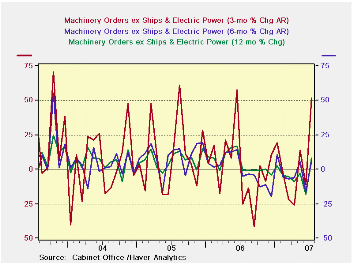 Global| Sep 11 2007
Global| Sep 11 2007Japan’s Core Machinery Orders Rebound
Summary
Japan sticks with the notion that it is still growing and that orders are generally expanding, but moving more or less sideways. Recent Japan macro data have been touch-and-go. In contrast the July core machinery orders reading is [...]

Japan sticks with the notion that it is still growing and that orders are generally expanding, but moving more or less sideways. Recent Japan macro data have been touch-and-go. In contrast the July core machinery orders reading is fairly strong. The rebound dominates the decline posted in June. Still, Japan’s officials view this as a sideways movement. Orders -- even core orders -- that remove large contracts from ship building and electric power are still quite lumpy. The Yr/Yr growth of orders tends to dampen the impact of the lumps; it shows growth at a firm 8.4%. Orders related to domestic demand are growing at a pace of 5%. Foreign orders are still the source of strength, up by 12.6% Yr/Yr.
| M/M % | SAAR % | |||||
| SA | Jul-07 | Jun-07 | May-07 | 3-Mos | 6-Mos | 12-Mos |
| Total | -0.6% | -6.5% | 5.8% | -6.5% | -2.5% | 7.9% |
| Core Orders* | 17.0% | -10.4% | 5.9% | 51.9% | 6.1% | 8.4% |
| Total Orders | ||||||
| Foreign Demand | -10.8% | -5.9% | 5.5% | -38.5% | -6.6% | 12.6% |
| Domestic Demand | 6.7% | -6.5% | 5.9% | 24.9% | -2.8% | 5.0% |
| * Excluding ships and electric power | ||||||
Robert Brusca
AuthorMore in Author Profile »Robert A. Brusca is Chief Economist of Fact and Opinion Economics, a consulting firm he founded in Manhattan. He has been an economist on Wall Street for over 25 years. He has visited central banking and large institutional clients in over 30 countries in his career as an economist. Mr. Brusca was a Divisional Research Chief at the Federal Reserve Bank of NY (Chief of the International Financial markets Division), a Fed Watcher at Irving Trust and Chief Economist at Nikko Securities International. He is widely quoted and appears in various media. Mr. Brusca holds an MA and Ph.D. in economics from Michigan State University and a BA in Economics from the University of Michigan. His research pursues his strong interests in non aligned policy economics as well as international economics. FAO Economics’ research targets investors to assist them in making better investment decisions in stocks, bonds and in a variety of international assets. The company does not manage money and has no conflicts in giving economic advice.
More Economy in Brief
 Global| Feb 05 2026
Global| Feb 05 2026Charts of the Week: Balanced Policy, Resilient Data and AI Narratives
by:Andrew Cates






